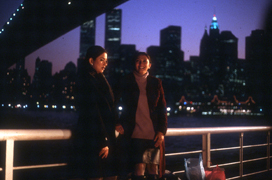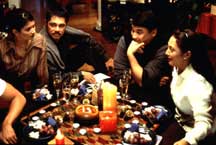How to Cook an American Adobo
by Joseph Palis
 It's hard not to be swept by the integrity of Laurice Guillen's American Adobo, and any cineaste can see right away how the filmmakers worked hard for this film to take flight. Maybe that is the film's ultimate misstep and problem: it was done with all seriousness that it smothered the life of an otherwise keenly observed and intelligent film.
It's hard not to be swept by the integrity of Laurice Guillen's American Adobo, and any cineaste can see right away how the filmmakers worked hard for this film to take flight. Maybe that is the film's ultimate misstep and problem: it was done with all seriousness that it smothered the life of an otherwise keenly observed and intelligent film.
The film is like a Filipino version of Lawrence Kasdan's The Big Chill and Kenneth Branagh's Peter's Friends in that friends meet again after some time to update themselves about each others' lives. Naturally, the assembled group archetypically represent a sector of Filipinos living abroad. Using the quintessential Filipino dish adobo as a symbol for the characters' rootedness in their native land, the film brings to mind Nancy Savoca's Household Saints where it realistically shows people at the second stage of their adjustment in a strange and foreign land -- their foreignness made apparent by their fondness for traditional Filipino ways and food.
It is true that Filipinos love food with the same reverence as the Mexican people in Laura Esquivel's Como Agua Para Chocolate, or the people steeped in tradition in Babette's Feast, or even its Asian counterparts in Eat Drink Man Woman. Eating is a national pastime, while conversations are hastily-assembled pieces to surround food-partaking. Small wonder that the foreign audience, unused to this Filipino proclivity may consider the prolonged dinner scenes as unrealistic and totally strange.
The conversations were truly Filipino at its ribbing best, but one wonders if the "heavier" discussions on local politics, spiritual incompleteness, and the perpetual search for identity were stuff most Filipinos can comfortably air in a sacred setting: the dining table.
Marisa (Dina Bonnevie) is a barely-human human whose gratification and contentment in life lie on the reflected love of her boyfriends. She loves them with a passion, almost to a fault, as if her completeness can be assured by the love of a man--an American man at that. She seeks to solidify her niche among friends that she is stylish, been-there-done-that sophisticate, and a dispenser of fashion advice for the dowdy. Which, of course ruffles the homely and homey Tere (Cherry Pie Picache). When Marisa suggested that Tere can make herself more presentable and more marriageable, Tere bristled: "Why? Just because I am single does not mean I am lonely". Tere personifies many Filipinos who retain much of their Filipino-ness in foreign places as a way of coping to the strange demands of the strange city they are in, and at the same time, as a medallion to show off (whether done in good faith or malicious) to friends and compatriots that they are still unchanged and have control of their environments. Tere is looking for an elusive lover, but as seen in the movie, the subtle rejections of her potential boyfriends sadly point to her innate hominess rather than character flaw. Her devotion to novenas and prayerful meditations were sometimes too uncomfortably real, it makes one cringe seeing her pining her hopes on anyone who will consider her desirable.
Mike represents the family man whose unhappy marriage was made even more apparent and heartbreaking by his lack of connectedness to his children, and his not-fully-articulated hatred for the country his family now calls their own. He is like a Grandfather's Clock whose reliable rhythm and usefulness are taken for granted by people who are themselves caught in a milieu too complex to be verbalized. As the movie tells us, he used to be a heartthrob during their schooldays, yet he feels he is only a shadow of his former self--a glorified zombie in the land of milk and honey.
 Gerry (Ricky Davao) is something else. We see him as well-adjusted and appropriately Filipino, but his veneer of placidity hides a terrifying secret. He is gay in a country where boys belabor how to tell their parents they are gay, as opposed to his native country where boys are supposed to suppress whatever homosexual propensities they have because of the wrath of patriarchy to those who are gay. We see Gerry facing a dilemma whether to tell his beloved mother of his sexual orientation and risk rejection and the pain of being disowned, or telling her face-to-face of this. Later we see him tearfully bid his American lover goodbye in a scene so uncomfortably similar to "Longtime Companion". His mother (Gloria Romero), having been warned earlier by Gerry's American lover that he is homosexual, was beside herself with sadness and a feeling of failure for having brought up a gay son.
Gerry (Ricky Davao) is something else. We see him as well-adjusted and appropriately Filipino, but his veneer of placidity hides a terrifying secret. He is gay in a country where boys belabor how to tell their parents they are gay, as opposed to his native country where boys are supposed to suppress whatever homosexual propensities they have because of the wrath of patriarchy to those who are gay. We see Gerry facing a dilemma whether to tell his beloved mother of his sexual orientation and risk rejection and the pain of being disowned, or telling her face-to-face of this. Later we see him tearfully bid his American lover goodbye in a scene so uncomfortably similar to "Longtime Companion". His mother (Gloria Romero), having been warned earlier by Gerry's American lover that he is homosexual, was beside herself with sadness and a feeling of failure for having brought up a gay son.
Raul (Paolo Montalban) is quite apart from the group. He seems to have synthesized the ideal Filipino traits with his Americanization. His character enjoys the bounty of America. His promiscuity and sexual proclivities deftly parries questions about his heterosexuality and lack of commitment to anything/anyone. We see him in various angles of copulations and rarely see him introspect. He seems unselfconscious about his physicality most uptight Filipinos find too outre. The scare of HIV infection brought him back in orbit and resolutely made a more responsible person in him. His new life immediately eclipsed his moral bankruptness.
 The film is really better than average Filipino movies because it was non-formulaic (no violence-dripped action scenes, no prolonged and gratutious sex scenes, no unwanted nudity, and a tasteful re-treading of the drug issue), and is a bit talky. Maybe it's because the scene was set in Woody Allen's New York, which is why the film spent a good deal of its running time exploring one's innermost thoughts by talking to each other and airing their gripes. If there's one thing that American Adobo succeeds in showing, its the Filipinos' intrinsic love for real melodrama and tragic stories with real catharsis in the end. Non-Filipinos usually cannot grasp or understand the level of fascination and intimacy these small things bring to Filipinos who grew up in the Philippines. While most of these "melodramatic" moments were considered by non-Filipinos (or Filipinos who did not grow up in any of the Philippines' islands) as foolishly sentimental, it has emotional resonance to its people and authenticates their identity.
The film is really better than average Filipino movies because it was non-formulaic (no violence-dripped action scenes, no prolonged and gratutious sex scenes, no unwanted nudity, and a tasteful re-treading of the drug issue), and is a bit talky. Maybe it's because the scene was set in Woody Allen's New York, which is why the film spent a good deal of its running time exploring one's innermost thoughts by talking to each other and airing their gripes. If there's one thing that American Adobo succeeds in showing, its the Filipinos' intrinsic love for real melodrama and tragic stories with real catharsis in the end. Non-Filipinos usually cannot grasp or understand the level of fascination and intimacy these small things bring to Filipinos who grew up in the Philippines. While most of these "melodramatic" moments were considered by non-Filipinos (or Filipinos who did not grow up in any of the Philippines' islands) as foolishly sentimental, it has emotional resonance to its people and authenticates their identity.
American Adobo's indoor scenes were quite effective and never claustrophobic. It allows us to be in a cozy place where food and conversation co-exist as if it's Nature's plan. The reference and apparent reverence to Filipino food (symbolized by adobo) typify the hearty gusto of Filipinos to be together and to exchange subtle but cruel jests to one another that were altogether seen as normal and routine.
The American characters were too staid and safe that one feels they were directed by a Filipino director. There is something rehearsed about their performances that do not point to lack of talent but to confusion on how to flesh out a character that is more Filipino than American. Or rather, more stereotypically American as glimpsed from Filipino eyes. The Afro bombshell/trophy girlfriend of Raul was relegated to doing sexy and unfaithful acts, while the American boyfriend/songwriter of Marisa never fully made us understand why being in love with many people at the same time is a complex character trait. In the film, he is just a lovable puppy whose free-loading ways could have been great material if Douglas Coupland's Generation X meanderings were brought to the fore. But then again, this film is not really about them, but about Filipinos living abroad. The fireman was a good character with nary a character defect. As if saying that more mature American citizens are better than the younger and more irresponsible Americans. I know its an unfair assessment, but with underwitten and two-dimensional roles, how can anyone think of them as anything but?
Gloria Romero was good in her small but memorable scene as an aggrieved mother of Gerry. But why on earth are they speaking English to each other? Is this film intended for American audiences, or are these characters really have facility with the English language? In fact, when one remembers the inflections and pronunciations of the characters, I can't really tell if Marisa really speaks American-accent English because she is a New York sophisticate, or because Dina Bonnevie-the actress happens to pronounce words like that. Gerry, Mike and Tere had this vocal inflection that is undeniably (unaccented) Filipino. Given the long period of time they stayed in the US, especially in New York, can't they at least speak with a pronounced Nu Yawk tawk?
Sandy Andolong's character has this unique twist. She is a Filipino living abroad as a househelp but when she is with her relative's (Susan Valdez) domicile, she is treated like a woman who must be reminded of her station in life. Small wonder that Mike slowly finds himself attracted to this wallflower and less-flamboyant version of his wife.
Some scenes were more effective than others. Gerry and Mike's goodbye scene was affecting without trying hard to be coy or fey. Gerry's confession of his crush (and long-denied love?) for Mike came full circle especially when the apparently clueless Mike remarked earlier in the film that he thought Gerry has this crush on him ever since their college days. Tere's incipient tears pulled at my heartstrings when she confessed to the worldy Marisa that she is always the homely one, the happy one, the loved one among their group, but they never really look at her as a sexually desirable woman. Which is why in the last scene where she proclaimed that her New Year's resolution was to be sexy, its a virtual wink to Marisa's earlier suggestion that Tere make herself more accessible and more sexual.
Which finally brings me to individual performances. Christopher de Leon is, most of the time, solid and reliable, but his hysterical outbursts were unforgivably excessive. Where was the naive ingenuousness he displayed in Ganito Kami Noon, Paano Kayo Ngayon? He should have Martin Scorsese coach him in acting so that Scorsese can lessen his over-the-top tendencies. Dina Bonnevie is highly uneven: she the picture of a tantrum-driven lady in one scene, then a sympathetic listener to her friend's woes the next with nary a smooth transition brought about by apparent introspections. Her scene where she drove her boyfriend away for the first time should have been reined by director Laurice Guillen. The first few outbursts were genuine, nay, even brilliant, but the succeeding ones were too pandering for my taste. Alright, she plays a spoiled narcissist and is given to childishness, but come on, there's got to be a line somewhere to delineate authentic emotions from sophomoric dramaturgy. Paolo Montalban was not utilized well. We see him cavorting with one partner to another and we never really fully understand his need for casual sex and short-term thrills. His great moment was in the scene where he was torn by indecision whether to have himself tested for AIDS or not. Not too many Filipino actors can act with ease and with apparent lack of self-consciousness. Frankly though, I don't really see much promise in his character because my impression of him was shaped by the company he seeks and the devices that people his world. He could get back to where he was before without batting an eyelash.
Ricky Davao was quite effective as a closet gay man. His actions were not stereotypically gay, but he conveyed volumes through economies of scale. His slightly closed legs while nervously discussing with Tere whether to go home to Manila to get hold of the incriminating nude photos he mailed to his mother, was quite unforced and quietly effective. His scenes with his mother made us see the duality of his nature as he struggles to be true to himself (i.e. gay) while maintaining his abeyance to his mother who represents the perpetuation of patriarchy (i.e. no gayness in the family).
 Cherry Pie Picache was the fulcrum of the movie. She expressively demonstrated her considerable talents in her natural and no-frills acting. She speaks like your typical friend from the US and is believable every step of the way; her character is unpretentious enough to prefer kitschy products over labels and she rose to the challenge to limn that nuance. With Gloria Romero and Ricky Davao, Picache is a true thing in the movie.
Cherry Pie Picache was the fulcrum of the movie. She expressively demonstrated her considerable talents in her natural and no-frills acting. She speaks like your typical friend from the US and is believable every step of the way; her character is unpretentious enough to prefer kitschy products over labels and she rose to the challenge to limn that nuance. With Gloria Romero and Ricky Davao, Picache is a true thing in the movie.
Its hard to sum up a film with obvious sterling qualities and laughably underwritten supporting roles (not to mention that we didn't really get a feel of New York in the film except for some scenes in the Lower East Side), but maybe the way to see it in a good light and with delicacy, is to see it for the first time -- not as a Filipino who is immersed and gorged in our own pop cultures and images and conversant to the smallest linguistic detail, but as a foreigner who wants to see what a typical Filipino looks like in an American setting, or to see a Filipino film and get a glimpse of their peculiarities. The problem is, one might not get a correct picture.
Or maybe a healthy and plentiful helping of authentic Filipino adobo might succeed in explaining the nuances of being a Filipino than this movie.
email comments to: southofsomeplace@zipmail.com
Copyright (c) 2005 erasing clouds |
|